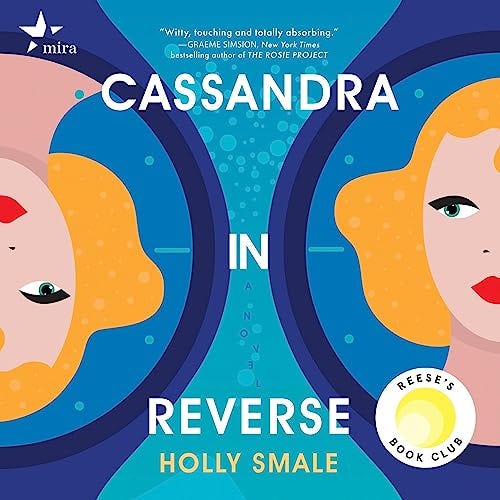Cassandra Penelope Dankworth likes patterns and repetition. She wears the same jumpsuit on the same day of the week, every week—each day has its own color. She eats the same kind of banana muffin from the same London coffee shop every day. We meet her on the worst day of her life; her boyfriend has just dumped her, and she has just been fired. On top of that, the coffee shop is out of banana muffins. Suddenly, she accidentally discovers that she can move back in time. So Cassie decides to use this chance to make different choices and set her life to rights. Of course, what we think is right for us isn’t always what the universe has in mind.
It’s obvious to us right off the bat that Cassie is neurodivergent, but she can’t quite make sense of how and why she’s different from her flatmates and coworkers (more difficult situations for her). Smale creates an effective juxtaposition between the patterns Cassie controls and the way time travel thwarts her attempt to control her own destiny. Her clothes, her room, her mug at work, are all mostly within her control, although she does tend to lose it when someone disrupts things. But each time she goes back to fix something, she either inadvertently changes something else or finds that it’s impossible to change. The novel alternates between empathy for Cassie’s distress and humor as we laugh with our heroine—but never at her.
One of the more poignant through lines in Cassandra in Reverse involves Greek mythology, which Cassie’s late mother studied and taught at Cambridge. In myth, Cassandra is a prophet cursed to always speak the truth and never to be believed. In the novel, Cassie receives sign after sign pointing towards the truth, but unlike her namesake, she either can’t or refuses to understand the signs’ meaning. Again returning to myth, Cassie’s middle name refers to Penelope, a figure who weaves all day and undoes her weaving at night. Similarly, Cassie works hard to weave her life into something she wants, only to unravel days and hours to do things all over again.
The myths and relics of Ancient Greece are source of comfort for Cassie because they don’t change and while this soothes her need for order, it also comforts her by reminding her of the same memories of her mother. She visits the British Museum’s collection of artifacts frequently and takes great comfort in these unchanging objects that remind her of her mother. Her visits to the museum are a secret not because she is ashamed of this habit, but because she wants to experience everything in the same way each time. Even she understands that her passion for Ancient Greece is deeply tied to the memories of her mother that she wants to relive. Again, we find this tension between stasis and change, as she resists any influence that might influence those memories. She experiences deep discomfort as different memories surface, and she is eventually willing to change the way she sees her family.
By having Cassie repeat the same situations, Smale explores the way that our choices change as we develop more self-awareness. At first, Cassie’s trips back in time are meant to restore what she’s lost, the life she had gotten used to. She learns more about the people around her and begins to make changes to be kinder to them, more aware of their needs as well as her own. As the novel approaches its conclusion, she goes back to change her life to better fit the self she has uncovered. On the other hand, she accepts that some patterns are inescapable and some people are going to be in our lives no matter what happens.
I highly recommend the audiobook! I try to listen to any book with an accent I can’t replicate in my head. This narrator is great and I love her different voices.




